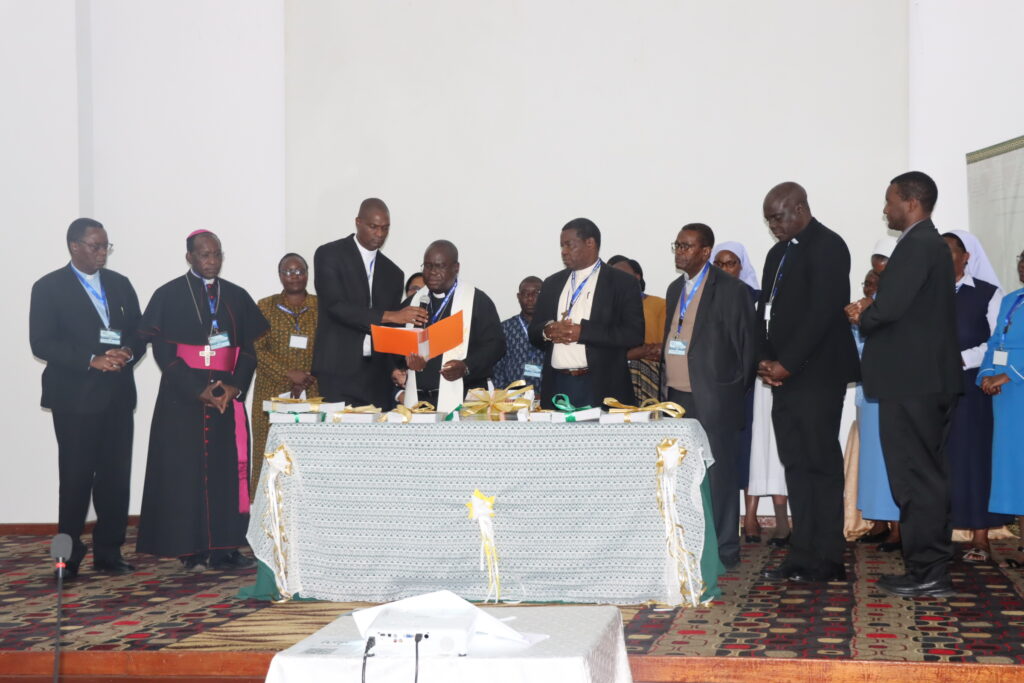AMECEA/CCC: “It is possible to make a change”, Childcare Stakeholders Justify Global Reforms.

Bishops and other participants
Elizabeth Asasha
A Regional Portrait of Catholic Care for Children in Eastern Africa gives leeway to integrating children in institutional Care into family and community-based care. A Catholic Care for Children gathering convoked to “Read the Signs of Times Together” on the care and protection of minors in the East African region has revealed that “it is possible and inevitably necessary” to deinstitutionalize childcare.
In research on childcare and protection based on data from Kenya, Malawi, Uganda, and Zambia, the international network of Religious congregations justified the inevitability of global reforms, drumming up the family as the ideal context for the care of vulnerable children.
Nicole Moran, a representative of the Washington D.C.-based Moran & Associates education and children’s rights law firm, presented key findings of the Regional Portrait study on behalf of Catholic Care for Children (CCC), the Association of Member Episcopal Conferences in Eastern Africa (AMECEA), and the Gerald and Henrietta Rauenhorst (GHR) Foundation.
“We can confidently state that since Catholic Care for Children became operational in Uganda, Kenya, and Zambia at least 3,650 children have been reintegrated, reunited with their biological parents or extended families, or with a small percentage fostered or placed in alternative care.” Said Nicole who moderated the Tuesday, May 16 launch of the regional portrait termed as CCC’s heart that will define the design of the recommended reforms and lead the teams in each of the four countries in Eastern Africa.
“CCC embraces a holistic approach to service provision including Education, Healthcare and Nutrition, Family Counselling and Psychosocial support, alternative care coordination and linkage, rehabilitation for children with special needs, and family strengthening.” Explained Nicole pointing out that the study has identified nearly all childcare institutions and support gaps in the regional childcare initiatives.
The Catholic Care for Children has discerned the omens of the times and, through national associations of religious programs, is actively contributing to a vast global trend in care reform that aims to reduce recourse to institutional care in favor of family- and community-based care for children.
The Association of the Sisterhoods of Kenya (AOSK), through Catholic Care for Children Kenya (CCCK) is involved in child protection interventions and the deinstitutionalization of children. Sr. Delvin Mukhwana, the program manager oversees the CCCK program spread across 25 catholic dioceses in Kenya and supports congregations with a charism of care for children by assisting them in making the transition from institutional care to family-centered and holistic care for children.
The Rationale Behind Global Care Reforms
The Catholic Care for Children in Uganda (CCCU) was born in response to the propounded global childcare reforms on emergent legal framework around childcare and the possible implications on the nuns in the event of non-compliance.
Sr. Euphresia Masika the National Programme Director of CCCU, disclosed that most Residential Care Facilities (RCFs), though founded on the religious charism for the care of vulnerable children, fell short of the child safeguarding best practice standards. This, she says, fueled the need to champion childcare transformations in Uganda.
Sr. Masika brought to light the findings of baseline research conducted in Uganda in the wake of a sharp increase in orphanages.
“Religious brothers and sisters were caring for vulnerable children guided by love, charism, and passion to take care of children as opposed to following the spelled out international standards,” noted Sr. Masika, who oversees the work of women and men religious with the charism of caring for vulnerable children in 44 childcare institutions across Uganda.
Sisters were keeping children in childcare facilities for a very long time, according to the study findings, which also revealed that a majority of them were ignorant of case management protocols and procedures.”
“We had cases of boys and girls who had gone up to 30 years and they were still living in these institutions.” Said Masika highlighting the worst-case scenario of grandchildren sired in the children’s homes and orphanages.
“The children who had been brought up the CCI got to the age of getting married, and giving birth to children while still in a childcare institution.” She stated.
“Our homes were not recognized and registered by the Ministry of Gender, Labor, and Social Development and were operating illegally.” The nun continued, noting that there were also human resource gaps and that childcare facility administrators lacked the requisite social work, alternative care, and child safeguarding training, which she says prompted the Associate of the Religious in Uganda (ARU) to step in and streamline this religious apostolate.
“ARU had to take a proactive approach in the wake of care reforms to ensure we are championing best care practices and compliance and we were doing this with the support of the GHR Foundation.”
She added, “We agreed that though we have the charism to care for children, we shall do it in a new way and in tandem with what the law stipulates and this was the journey to deinstitutionalization.”
The centrality of Catholic nuns in child protection and safeguarding is rooted in the biblical mandate to care for the most vulnerable, animated by the principles of Catholic Social Teachings on human dignity and by the charisms of the Religious institutes.
“We make sure that a child is safeguarded from the mother’s womb when they’re born, all through the different spheres of life,” Sr. Masika explained, “whether normal or differently abled we are committed to taking care of them as Child Care fraternity.”
CCC continues to sensitize regional and international childcare actors to adopt the essential reforms that are key in addressing the dynamic signs of the times, “There is evidence that transition from residential childcare to family or community-based care is possible; though a gradual process and done in the best interest of the child.” Concluded Sr. Masika.


